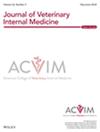Equine Blood Microbiome in a Cohort of Clinically Healthy Trail Riding Horses
Abstract
Background
Emerging research suggests the presence of a blood microbiome in clinically healthy individuals. Characterizing bacterial composition and abundance in blood from a group of healthy horses is of clinical interest.
Hypothesis/Objectives
Horses in a closed herd environment will have blood microbiomes with similarities among individuals.
Animals
Twenty trail-riding horses of different breeds and ages living in relative isolation on a dry lot pasture in Colorado at 7680 ft elevation.
Methods
Cross-sectional study. Blood was collected from the jugular vein into serum, blood collection, and EDTA tubes. Samples were submitted to external laboratories for microbiome analysis and routine blood tests (CBC, serum biochemistry).
Results
Venous blood is not sterile in healthy horses. A total of 293 bacterial genera were identified in these samples, whereas most horses had 55 to 70 genera. The most dominant taxa were Gardnerella, Sporomusaceae, Kapabacteriales, Beijerinckiaceae, and Phascolarctobacterium. Principal coordinate analysis, investigating microbial structure diversity, identified large variability with no obvious clustering, indicating dissimilarity among bacterial populations in different horses. All blood samples contained genera with pathogenic potential for horses, such as Bacteroides spp., Clostridium spp., Peptostreptococcus spp., Streptococcus spp., and Staphylococcus spp.
Conclusions and Clinical Importance
Clinically healthy horses had a diverse blood microbiome. Despite the relative isolation of the horses, their blood microbiota varied markedly among individuals. Investigating the bacteria in clinically healthy horse blood provides new insight into possible microbiome shifts that may result in clinical disease.


 求助内容:
求助内容: 应助结果提醒方式:
应助结果提醒方式:


